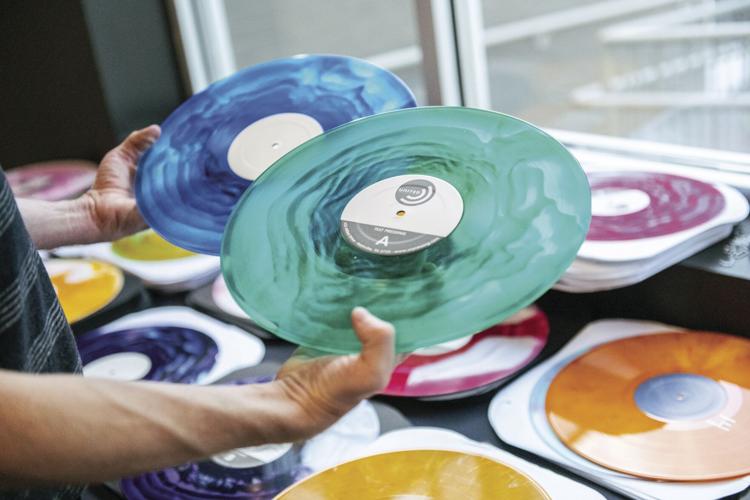
United Record Pressing
The music industry can be a fickle beast. A TikTok trend could send a record label suddenly scrambling to cash in. Artists once concerned about music video rotation now jockey for front-page position on Spotify playlists. And artificial intelligence continues to creep into corners of songwriting, a process that many still consider to be sacred — and human.
But if music-making is a fleeting business, no one told United Record Pressing.
The longtime Nashville vinyl pressing firm celebrates 75 years of operation in 2024, a rare achievement in an industry that has hop-scotched from vinyl as its medium of choice to cassette, CD, digital download — and back to the tried-and-true LP, coupled with streaming. After weathering the downturn caused by the CD explosion of the 1990s and digital expansion in the 2000s, United now operates as the oldest (and one of the most reliable) vinyl pressing plants in the U.S. At 155,000 square feet, the South Nashville shop employs about 120 people and produces roughly 30,000 records a day according to owner Mark Michaels, a onetime business management consultant who purchased United in 2007.
In 2023, United underwent an $11 million expansion that included two dozen new presses. Not bad for a business that, when Michaels purchased it, largely survived off making promotional singles for hip-hop artists to ship to radio stations.
“I’m a believer in the format and I’m excited about our organization,” Michaels says. He adds, “There’s a reason [vinyl] exists. I think that reason will persist. It complements every other aspect of music delivery, in a beautiful way. I think it’s the most important format in which artists can deliver their art.”

United Record Pressing
United launched in 1949 as Bullet Record Pressing, an offshoot of the Nashville label that produced some notable hits of the time, including Francis Craig’s big-band single “Red Rose” backed with “Near You”; the B-side was one of the first Billboard chart-topping singles to come out of Nashville. For decades, the press continued to roll, delivering early rock ’n’ roll, R&B and ragtime in the 1950s. In the ’60s, the plant stood at the forefront of Beatlemania: United pressed the first U.S. Beatles single, a 1963 version of “Please Please Me” backed with “From Me to You” that predates the band’s deal with Capitol Records.
Through the ebbs and flows of vinyl popularity in the 1980s and 1990s, the plant continued to be the first stop in record-making for artists who stood by the format. The White Stripes, The Shins, Kurt Vile, Neutral Milk Hotel and more entrusted United with early-career pressings. But prior to the mainstream reemergence of LPs in the 2010s, it wasn’t always easy for United to keep the lights on. Promotional presses and legacy releases — like an anniversary box set of Miles Davis’ Kind of Blue — helped feed the company during its lean years.
“It was terrifying,” Michaels says. “We were pressing some Johnny Cash or Elvis catalog. … We were running half-shifts and trying to keep people on payroll, but being mindful of our finances. We were really hunkered down and scrounging for opportunities where we could find them.”
Things got better, of course, with a few growing pains along the way. In 2021 and 2022, the ripples of COVID-19 impacted vinyl production and major label orders clogged pressing plants in the U.S. and abroad. United expanded at its Allied Drive location in hopes of meeting the capacity needs of a pop chart-topper without causing painful production delays for the indie artists who helped propel vinyl to its modern success.
Today, the company presses albums for megastars like Harry Styles, Adele and Taylor Swift, while also working alongside DIY musicians like Jeffrey Novak, a solo artist who was also frontman of Nashville garage-rock outfit Cheap Time. Novak has pressed eight projects with United, including his new solo LP Blood Celebration. He keeps working with the company in part because of manageable turnaround times and the ability to connect locally with the plant’s staff.

United Record Pressing
“I always felt like they take independent artists seriously — we’re not treated like small change,” Novak says. He later adds, “Any place that keeps a tradition like United has, it’s heartwarming. It means something deep.”
And as United celebrates 75 years, Michaels believes one part of the company’s future may be found in its old building, a 26,000-square-foot plant on Chestnut Street. It’s part of vinyl music history and should be appreciated by fans of the format, he says. The building includes the so-called “Motown Suite,” a living space and gathering area that remains largely unchanged from its time hosting parties for Smokey Robinson, The Supremes and other artists — when segregation meant they weren’t welcome in other places.
“How do we start to activate [the building] in a way that allows the world to appreciate the important history?” Michaels says. “We’re looking into some different things right now.”










